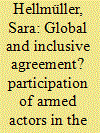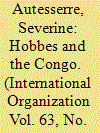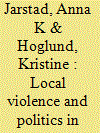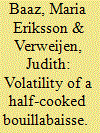|
|
|
Sort Order |
|
|
|
Items / Page
|
|
|
|
|
|
|
| Srl | Item |
| 1 |
ID:
165663


|
|
|
|
|
| Summary/Abstract |
This article provides an analytical framework to understand how participation of armed actors in peace negotiations influences local violence. It argues that the link between violence and exclusion or inclusion of armed actors is often indirect and depends on armed actors’ underlying motivations to be included and their corresponding strategies. Based on an analysis of the Congolese peace process from 1999 to 2003, the article assesses how the mandate of the peace process influenced armed groups’ motivations to be included. It then analyzes the strategies that armed actors used to be included and examines their impact on local violence. Thereby, it allows for a more nuanced understanding of how participation of armed actors in a mediation process influences prospects for peace.
|
|
|
|
|
|
|
|
|
|
|
|
|
|
|
|
| 2 |
ID:
090436


|
|
|
|
|
| Publication |
2009.
|
| Summary/Abstract |
Why do international peacebuilders fail to address the local causes of peace process failures? The existing explanations of peacebuilding failures, which focus on constraints and vested interests, do not explain the international neglect of local conflict. In this article, I show how discursive frames shape international intervention and preclude international action on local violence. Drawing on more than 330 interviews, multi-sited ethnography, and document analysis, I develop a case study of the Democratic Republic of Congo's transition from war to peace and democracy (2003-2006). I demonstrate that local agendas played a decisive role in sustaining local, national, and regional violence. However, a postconflict peacebuilding frame shaped the international understanding of violence and intervention in such a way that local conflict resolution appeared irrelevant and illegitimate. This frame included four key elements: international actors labeled the Congo a "postconflict" situation; they believed that violence there was innate and therefore acceptable even in peacetime; they conceptualized international intervention as exclusively concerned with the national and international realms; and they saw holding elections, as opposed to local conflict resolution, as a workable, appropriate, and effective tool for state- and peacebuilding. This frame authorized and justified specific practices and policies while precluding others, notably local conflict resolution, ultimately dooming the peacebuilding efforts. In conclusion, I contend that analyzing discursive frames is a fruitful approach to the puzzle of international peacebuilding failures beyond the Congo.
|
|
|
|
|
|
|
|
|
|
|
|
|
|
|
|
| 3 |
ID:
139236


|
|
|
|
|
| Summary/Abstract |
This article analyses the narratives of survivors of violence in KwaZulu-Natal, South Africa, and addresses the relationship between local violence, politics and agency in a post-conflict setting. In particular, the study advances an understanding of how local political violence serves to increase or decrease agency. In line with previous research on emotions and agency, our study suggests that fear and anxiety encourage risk avoidance and have a pacifying effect on survivors of violence. It also indicates that anger and enthusiasm are emotions experienced by those who have a strong sense of agency and have become politically mobilised after violence. The study contributes to the debate on local capacity for peacebuilding and democracy by showing how local agency is affected by violence and how survivors of violence can become agents of change through politics.
|
|
|
|
|
|
|
|
|
|
|
|
|
|
|
|
| 4 |
ID:
152875


|
|
|
|
|
| Summary/Abstract |
It is often noted in resource curse literature that agricultural economies are less conflict-prone than countries managing mobile, high-value resources. In the vast literature linking resource endowment and conflict, cash crop economies are often considered immune to civil violence, believed to stand apart from the many horrific episodes of violence and civil war centered on “lootable” wealth (such as alluvial diamonds, tin, tungsten, or other conflict minerals). But many incidents of violence—especially local violence—are in fact occurring in cash crop economies. Drawing on newspaper accounts, policy analyses, ethnographic interviews, and in-depth reports by international organizations, I examine an episode of local violence in 2010 in Kyrgyzstan. Through this case study, the article provides a better understanding of local violence in cash crop economies that can apply to other weak states.
|
|
|
|
|
|
|
|
|
|
|
|
|
|
|
|
| 5 |
ID:
123503


|
|
|
|
|
| Publication |
2013.
|
| Summary/Abstract |
In early 2012, Congolese army deserters formed the M23 rebel movement. This article analyses the insurgency and other armed group activity in the eastern DRC in the light of the politics of rebel-military integration. It argues that military integration processes have fuelled militarization in three main ways. First, by creating incentive structures promoting army desertion and insurgent violence; second, by fuelling inter- and intra-community conflicts; and third, by the further unmaking of an already unmade army. We argue that this is not merely the product of a 'lack of political will' on behalf of the DRC government, but must be understood in the light of the intricacies of Big Man politics and Kinshasa's weak grip over both the fragmented political-military landscape in the east and its own coercive arm. Demonstrating the link between military integration and militarization, the article concludes that these problems arise from the context and implementation of integration, rather than from the principle of military power sharing itself. It thus highlights the crucial agency of political-military entrepreneurs, as shaped by national-level policies, in the production of 'local violence'.
|
|
|
|
|
|
|
|
|
|
|
|
|
|
|
|
|
|
|
|
|